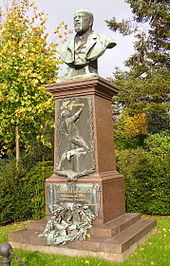Eduard Hoffmann (industrialist)
Eduard Hoffmann (born September 12, 1832 in Magdeburg , † December 16, 1894 in Salzuflen ) was a German entrepreneur . He was the son of the company 's founder Heinrich Salomon Hoffmann , and under his leadership Hoffmann's starch factories - the oldest industrial company in Bad Salzuflen - developed into a globally active group within a few years.
Education and family
As the fourth of nine children of his parents Heinrich Salomon Hoffmann (* May 5, 1794 in Fürth ; † May 8, 1852 in Salzuflen) and Friederike Hoffmann born. Peltz (born July 11, 1806 in Wolmirstedt ), he attended elementary school in Magdeburg . As his family moved to Oeynhausen , Hoffmann moved to the so-called Real Department of the Lemgoer Gymnasium and from July 1846 to September 1847 to the Gymnasium in Minden . At the age of sixteen he began a commercial apprenticeship in his father's company in Bad Oeynhausen and then moved to his brother Leberecht Fürchtegott Hoffmann's company in Bremen . After a short stay at the trading company Hoppe & Comp. in Dresden , Eduard Hoffmann came to Bad Salzuflen in October 1850 and supported his father, who was now working there.
In 1860, at the age of twenty-eight, Hoffmann married the 20-year-old Johanne Böhmer from Blomberg . They had four children, the second of whom, Leberecht, later succeeded his father. Johanne died on August 7, 1868, and Eduard Hoffmann married Minna Loßnitzer from Berlin in February 1871 . He had three more children with her. In 1883 the marriage was divorced again. In 1886 Hoffmann married a third time, the marriage to Magda Müller from Remmighausen remained childless.
Hoffmann's starch factories

After the death of his father in May 1852, he took over the management of the starch factory, but ran the business on behalf of his mother and under the supervision of his brother. Without much financial advantage for himself, he initially increased sales of the high-quality starch products. In order to improve the quality even further, on his initiative in the mid-1870s, production switched from grain and potatoes to rice: the starch was given greater quality and better quality. To make the product even better known, the preening cat was as Hoffmann's figurative developed. From now on, the white cat was emblazoned on all packs, bags and cardboard boxes, but also on all kinds of promotional items such as postcards, notebooks, games, calendars, fairy tale booklets, boxes and signs as a symbol of absolute cleanliness.
Eduard Hoffmann's greatest merits, however, were the welfare institutions that he, who rarely appeared in public and was never involved in a party or an association, created and ran for his employees: for example, he had apartments and a small department store built the health or pension insurance.
death
On June 5, 1888, Eduard Hoffmann was given honorary citizenship by the city council of Salzuflen . He died on December 16, 1894 at the age of 62 in Salzuflen. Hoffmann, who with new ideas had created a large work that had advanced Salzuflen and even the whole of Lippe , was buried in the cemetery on today's Rudolph-Brandes-Allee between Bad Salzuflen and the district of Schötmar .
The company management honored Eduard Hoffmann with the words: “Until the last hour, working with the utmost energy and unrelenting creativity for the prosperity of the work, the deceased brought it to its present day importance. So he was torn out in the middle of an activity which filled his whole being and in which he combined extraordinary altruism with exemplary benevolent disposition towards all those who were allowed to work under his leadership on the work and who now painfully mourn his loss. "
On December 31, 1894, his son Leberecht Hoffmann (* July 2, 1863 in Salzuflen; † October 19, 1928 in Bad Salzuflen) was appointed by the board of directors of Hoffmann's starch factories and thus his successor.
Others
In honor of Hoffmann, the secondary school in the Lohfeld school center has had his name since May 30, 2008: Eduard-Hoffmann-Realschule.
literature
- Wilhelm Schulte: Hoffmann, Eduard. In: New German Biography (NDB). Volume 9, Duncker & Humblot, Berlin 1972, ISBN 3-428-00190-7 , p. 405 f. ( Digitized version ).
- Gustav Delpy: Festschrift for the fiftieth anniversary of Hoffmann's starch factories AG Salzuflen on September 29, 1900 . Salzuflen 1900.
- Franz Meyer, Stefan Wiesekopsieker: Company archive from Hoffmann's starch factories on permanent loan in the Bad Salzufler city archive . In: Archive maintenance in Westphalia and Lippe . Issue 39, April 1994.
- Otto Sartorius: 100 years of Hoffmann's starch factories, Bad Salzuflen. A memorial book . Bielefeld 1950.
- Richard Tiemann: 80 years of Hoffmann's starch factories, 60 years of Hoffmann's rice starch brand cat. A review and outlook . 1930.
- Richard Tiemann: The welfare institutions of Hoffmann's starch factories Aktiengesellschaft Bad Salzuflen . Lemgo 1936.
- Richard Tiemann: Eduard Hoffmann September 12, 1832 to December 16, 1894. The founder of the German rice starch industry. The creator of Hoffmann's starch factories Aktiengesellschaft Bad Salzuflen . FL Wagener, Lemgo 1850 (private print for Hoffmann's starch factories AG).
- Stefan Wiesekopsieker: Hoffmann's starch factories Bad Salzuflen. 140 years of company history in words and pictures . Geiger, Horb am Neckar 1990, ISBN 3-89264-451-9 .
- Stefan Wiesekopsieker: Lecture on the occasion of the naming ceremony at the Eduard-Hoffmann-Realschule . Bad Salzuflen 2008.
| personal data | |
|---|---|
| SURNAME | Hoffmann, Eduard |
| BRIEF DESCRIPTION | German entrepreneur |
| DATE OF BIRTH | September 12, 1832 |
| PLACE OF BIRTH | Magdeburg |
| DATE OF DEATH | December 16, 1894 |
| Place of death | Salzuflen |


